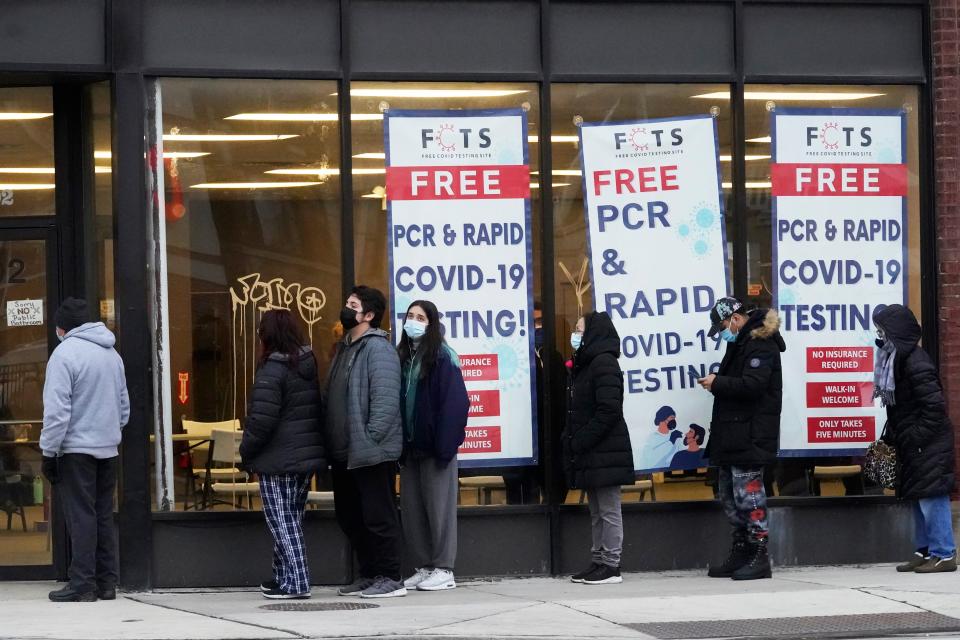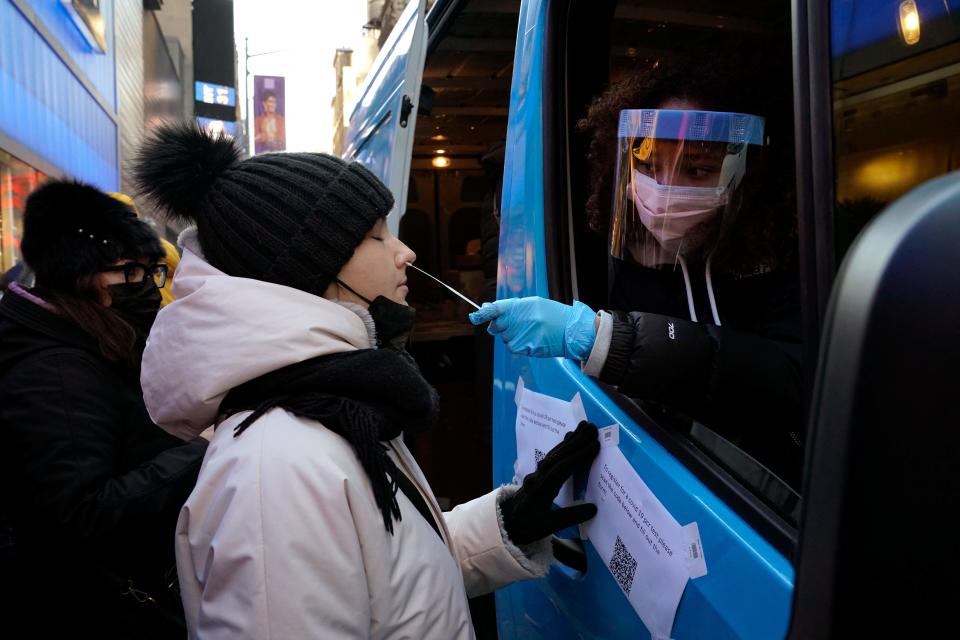'Challenging' times, 'frustrating' COVID-19 case counts: US confronts post-holiday omicron surge
- Oops!Something went wrong.Please try again later.
Less than six weeks after global health officials warned of the omicron variant of the coronavirus, the United States is reporting record numbers of new COVID-19 cases and pediatric hospitalizations, some schools are returning to virtual learning, and tests are in short supply.
"These coming weeks are going to be challenging," President Joe Biden acknowledged Tuesday in an address to the nation before he and Vice President Kamala Harris met with the White House COVID-19 task force.
Omicron is "much different than anything we've seen before," Biden said, calling on all Americans to get vaccinated and boosted and to wear a face mask in public.
"If you're vaccinated and boosted, you are highly protected. Be concerned about omicron, but don't be alarmed. If you're unvaccinated, you have reason to be alarmed," Biden said. "Some will die, needlessly die."
FACT CHECK: Omicron coronavirus variant is not the common cold
In the week ending Monday, there were 3.36 million new cases, a USA TODAY analysis of Johns Hopkins University data shows. That's almost five times as many as the nation reported in the week ending Nov. 23, just before the world learned of the variant called omicron.
"The bottom line is that omicron is going to visit every city and town in the country and make its presence known," Bruce Walker, director of the Ragon Institute at Massachusetts General Hospital, Massachusetts Institute of Technology and Harvard University, said in a news briefing Tuesday.
On Monday alone, the U.S. logged more than 1 million new cases, and 26 states reported record numbers of cases. The count is artificially inflated because of backlogged cases from the New Year's weekend. The numbers, though, do not account for results from at-home rapid tests to detect the coronavirus.

The surge of infections has overwhelmed hospitals and created staffing shortages that upended air travel and prompted multiple school districts to extend winter breaks, cancel classes or shift to virtual learning. Experts say the worst may still be to come.
Jacob Lemieux, an infectious diseases physician at Massachusetts General Hospital, said the outbreak is "an omicron pandemic at this stage." Omicron makes up more than 95% of new COVID-19 cases, the Centers for Disease Control and Prevention said Tuesday.
"I think it's really hard to say how long this is going to last, but the next few weeks are going to be bad," Lemieux said. "If people can buckle down for three weeks, then they should."
News of the potentially troublesome variant in South Africa began to circulate in November, and the World Health Organization declared omicron a "variant of concern" the day after Thanksgiving. Cases in South Africa peaked in mid-December and have steadily declined since, Johns Hopkins University data suggests.
HOW DOES COVID-19 AFFECT ME? Don’t miss an update with the Coronavirus Watch newsletter
Dr. Monica Gandhi, an infectious disease expert at the University of California, San Francisco, said the trajectory of omicron in South Africa could mean a short wave in the USA.
"If we can extrapolate from the South Africa experience, I think cases from the omicron wave in the U.S. will start coming down by mid- to late January and then come down quickly," Gandhi said.
Studies show the omicron variant tends to be milder than earlier variants. But with so many people getting sick, more are getting seriously ill. In the latest week, hospitals admitted about 46.5% more COVID-19 patients than in the week before, according to the Department of Health and Human Services.
As of Monday, more than 100,000 COVID-19 patients were in U.S. hospital beds – the most since early September, when the delta variant was peaking in the South. About 78% of intensive care unit beds were occupied, and 19,000 patients were in COVID-19 ICU beds.
Biden said his administration deployed "hundreds of military doctors and nurses" in the past two weeks to assist hospitals "overrun and overworked because of unvaccinated COVID-19 patients." He said he directed the Federal Emergency Management Agency to provide hospital beds "whenever and wherever they’re needed."
To combat the surge, Maryland Gov. Larry Hogan declared a 30-day state of emergency on Tuesday and mobilized 1,000 National Guard soldiers to assist health officials.
"The truth is that the next four to six weeks will be the most challenging of the entire pandemic," Hogan said in a news conference. "All of the emergency actions we are taking today are to keep our hospitals from overflowing, to keep our kids in school and to keep Maryland open for business, and we will continue to take whatever actions are necessary in the very difficult days and weeks ahead."

Hospitalizations among children with COVID-19, in particular, are surging. During the week of Dec. 22-28, an average of 378 children ages 17 and under were admitted per day to hospitals, a 66% increase from the previous week , the CDC reported Thursday.
At the nation's largest pediatric hospital, Texas Children's Hospital in Houston, nearly 70 children were hospitalized with COVID-19 on Monday. The week before, the hospital had 30 patients with COVID-19 and 15 the prior week, spokesperson Natasha Barrett said.
"Over the weekend, we shattered prior records that we established during the delta surge," Dr. Jim Versalovic, who runs the hospital's COVID-19 Command Center, said on a Zoom call.
Most COVID-19 patients are unvaccinated, Versalovic said. A majority of children have COVID-19 as a "primary factor" or "significant contributing factor" in their hospitalization, he said.
MAPPING COVID-19: Tracking US cases and deaths
In Illinois, hospital admissions of children with COVID-19 have nearly tripled since the beginning of December, Gov. J.B. Pritzker said in a news conference Monday. In some regions of the state, available ICU beds are in the single digits, he said. Unvaccinated patients fill 95% of ICU beds and "nearly 100%" of ventilators, he said.
"It is frustrating and tragic that two years into the pandemic – with multiple widely available, free lifesaving vaccines – that we are once again in this horrible position," he said. "With the holidays still only a week or two in the rearview mirror, I fear the climb will continue as the virus incubates in those who were exposed at the end of December."
Nearly 73% of U.S. adults are fully vaccinated, and more than a third have been boosted, according to the CDC. Nearly 66% of people ages 5 and older have been fully vaccinated.
The CDC updated its booster shot guidelines Tuesday, shortening the wait time from six to five months for people who received the Pfizer-BioNTech vaccine. On Monday, the Food and Drug Administration expanded the emergency use authorization of a booster dose of the Pfizer-BioNTech vaccine to include youths 12 to 15.
A tool to combat the spread of COVID-19 remains scarce even as the virus touches its fourth calendar year – tests. In an address before Christmas, Biden acknowledged the country is "not where we should be" on testing capabilities.
"I know this remains frustrating," Biden said Tuesday. "Believe me, it's frustrating to me. But we're making improvements."
Biden said his administration has established federal testing sites "all over the country" in the past two weeks. "With more capacity for in-person tests, we should see waiting lines shortened and more appointments freed up," he said.
He encouraged Americans to purchase tests from drugstores and online sites, which were "restocking." Starting next week, insurance companies must reimburse people for the tests, Biden said.
Local governments and health care providers pass out free tests for pickup, he said. Starting this month, Americans will be able to request free test kits from a federal website and have them mailed to homes, he said.
Contributing: Mike Stucka and Karen Weintraub, USA TODAY
This article originally appeared on USA TODAY: COVID: Joe Biden says omicron is 'different than anything we've seen'

